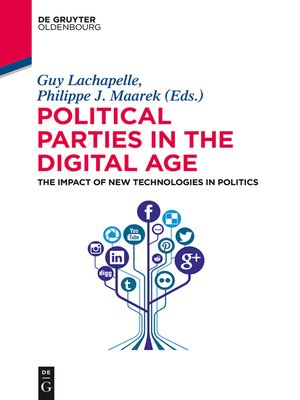Political Parties in the Digital Age
ebook ∣ The Impact of New Technologies in Politics · De Gruyter Textbook
By Guy Lachapelle

Sign up to save your library
With an OverDrive account, you can save your favorite libraries for at-a-glance information about availability. Find out more about OverDrive accounts.
Find this title in Libby, the library reading app by OverDrive.



Search for a digital library with this title
Title found at these libraries:
| Loading... |
The Internet and "social media" may initially have been understood as just one more instrument politicians could employ to manage without political parties. However, these media cannot be reduced to being a tool available solely to politicians. The electronic media make reinforcement of the "glocalization" of the public and political sphere, a process already set in motion with the advent of television, and they can develop the trend even further.
Political parties are therefore once again becoming indispensable; they are in an unparalleled position to recreate social and political bonds, for only they stand both at the center and on the periphery of the new sphere encompassing public and political life.
TABLE OF CONTENTS
New Technologies: Helping Political Parties and the Democratic Processes or Threatening Them? (Guy Lachapelle and Philippe J. Maarek)
Part I: The Integration of Technological Innovations in the Practices of Parties and Citizens
Innovations in Information Technology in American Party Politics Since 1960 (Kenneth Janda)
Internet, Social Media Use and Political Participation in the 2013 Parliamentary Election in Germany (Reimar Zeh and Christina Holtz-Bacha)
Part II: The Consequences of New Technologies on Activism
The Decline of Activism in Political Parties: Adaptation Strategies and
New Technologies (Eric Montigny)
Party Activists and Partisan Communication in Quebec (Isabelle Gusse)
Part III: The New Role Played by Social Networks
Changing Communications? Political Parties and Web 2.0 in the 2011 New Zealand General Election (Ashley Murchison)
Social Media and American Presidential Campaigns: The Dark Side of the
Electoral Process (Karine Premont and Charles-Antoine Millette)
Part IV: The Resilience of the Printed Press in the United Kingdom
The United Kingdom Independence Party (UKIP) and the British Press:
Integration, Immigration and Integrity (David Deacon and Dominic Wring)
Part V: New Technologies and Leadership Evolution
Political parties and the Internet: changes in society, changing politics –
the case of the Parti Quebecois (Guy Lachapelle)
Political communication, electronic media and social networks in France (Philippe J. Maarek)
Index of Proper Nouns






